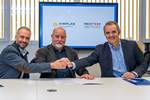Aimplas joins REFEST project for small fishing fleet vessel retrofit
Aimplas’ objectives considering composites for hull appendages and battery boxes add to REFEST’s core technical activities which aim to reduce emissions by up to 40% in traditional fishing vessels.
REFEST consortium. Source | Aimplas
, the Plastics Technology Centre (Valencia, Spain) is bringing its composites expertise to the REFEST project, which aims to retrofit traditional fishing fleets with innovative, low-cost technologies to significantly reduce fuel consumption and greenhouse gas (GHG) emissions.
Launched on May 1, 2024, and funded under the EU Mission “Restore our Ocean and Waters by 2030,” the REFEST project seeks to develop scalable solutions capable of reducing emissions by up to 40%. The project specifically focuses on retrofitting requirements for fishing vessels, environmental and biodiversity impact assessments, battery design and sensor integration, and economic and social evaluations. The technologies developed will be practical, easily deployable and economically sustainable.
The REFEST consortium comprises 14 academic and industrial partners from 10 countries, including Italy, Spain, Turkey, Lithuania, Norway, Denmark, Sweden, France, Germany and Poland: project coordinator Klaipeda University (KU), Research Institutes of Sweden (RISE), Morski Instytut Rybacki (MIR), Aimplas, Elkon, Rina Consulting, Tuco, Enco Srl, NXH, Bluenav, Calsens, EAS Batteries GmbH, Gemi Boats Scandinavia AS and Lithuanian Fisheries Producers Association (LFPA).
This diverse group brings together multidisciplinary expertise from the maritime, scientific, technological and industrial sectors to develop its solutions. As a key partner, Aimplas is contributing its expertise in materials research and innovation, ensuring the project’s success in meeting European environmental standards.
Aimplas will focus on two separate areas: improving the fiber-reinforced composite materials currently used in the marine industry to produce hull appendages, and developing novel thermoplastic composite (TPC) battery boxes and components.
To accomplish the first objective, a commercially available thermoplastic resin will be modified to reduce the effect of seawater ageing in composites and increase the compatibility of the manufactured composite with the selected paintings and coatings. Additionally, and in collaboration with the project partners CALSENS and RISE, Aimplas will integrate optical and piezoelectric sensors in the proposed composites, so that a range of pre-defined variables — such as hydrodynamic pressure or mechanical performance — can be measured in real time.
For its second objective, Aimplas is using a unidirectional tape format, which is specifically formulated to produce battery box components and comply with the standards governing the marine industry, particularly those regarding fire protection and electromagnetic interference.
Currently, REFEST partners are engaged in technical activities to develop the final solutions that will enable them to achieve the project’s goals. These efforts include designing and testing innovative technologies to improve the energy efficiency of fishing vessels and collaborating with local fleets to ensure practical and adaptable solutions.
In addition to its core technical activities, the REFEST project has initiated important networking activities and synergies with other EU-funded initiatives in the maritime and environmental sectors. These collaborations are expected to enhance the impact of the REFEST solutions and foster further innovation through the exchange of knowledge, technologies and best practices.
This project has received funding from the European Union’s Horizon Europe Research and Innovation Programme under Grant Agreement No. 101157663.
Related Content
-
Hybrid composite architecture enables rigid wind propulsion solution for maritime decarbonization
GT Wings’ AirWing leverages aerospace engineering principles combined with hybrid glass and carbon fiber composite construction to deliver up to 30% fuel savings through compact, deck-compatible wind propulsion.
-
Developing bonded composite repair for ships, offshore units
Bureau Veritas and industry partners issue guidelines and pave the way for certification via StrengthBond Offshore project.
-
European boatbuilders lead quest to build recyclable composite boats
Marine industry constituents are looking to take composite use one step further with the production of tough and recyclable recreational boats. Some are using new infusible thermoplastic resins.






